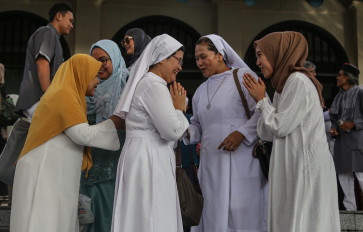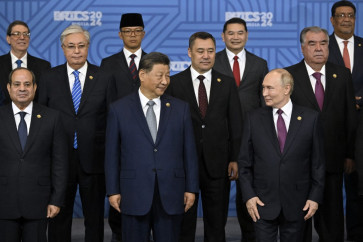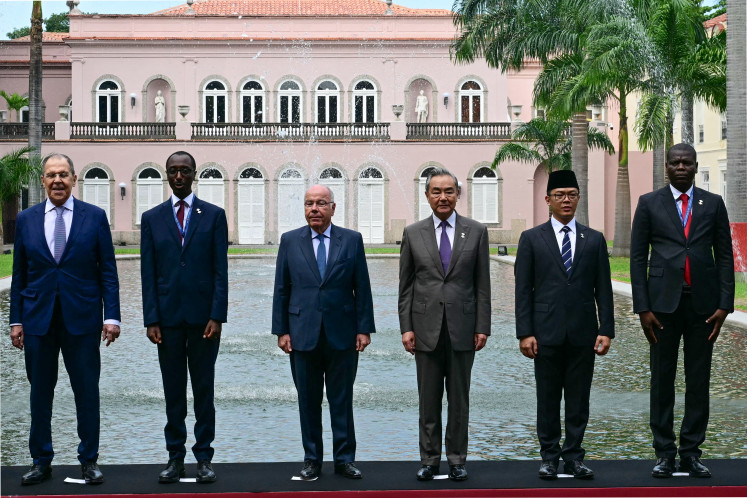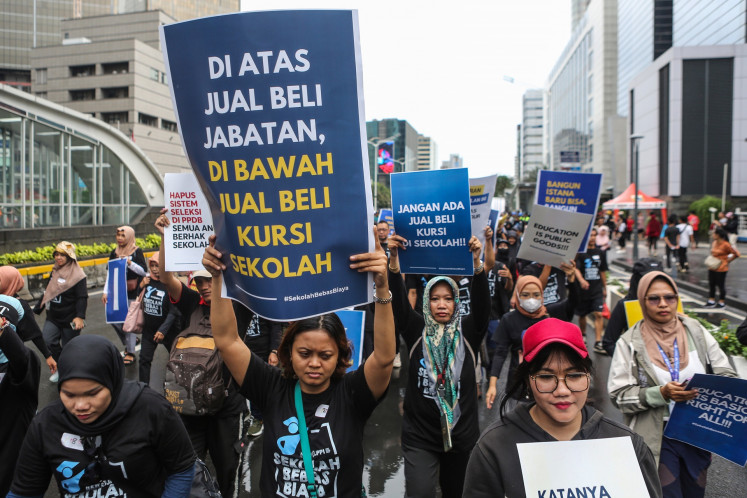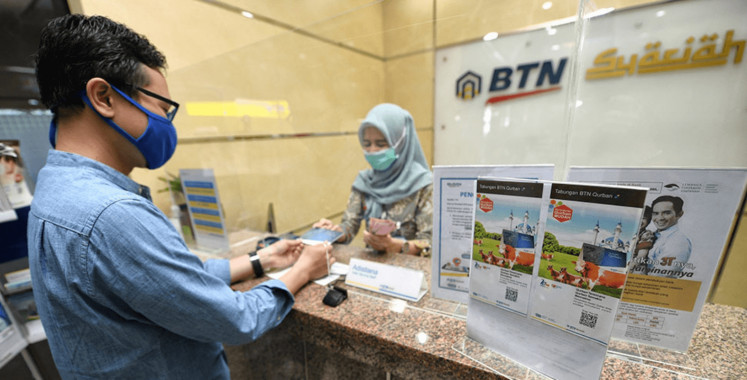Revived Masyumi pushes into Islamic politics
Conservative Islam has seen a recent resurgence in Indonesia’s political landscape, most recently with the reemergence of the born-again Masyumi Party. But moderates and other Islamic politicians were quick to dismiss the influence and aspirations of a minority group in the world’s largest Muslim-majority country.
Change text size
Gift Premium Articles
to Anyone
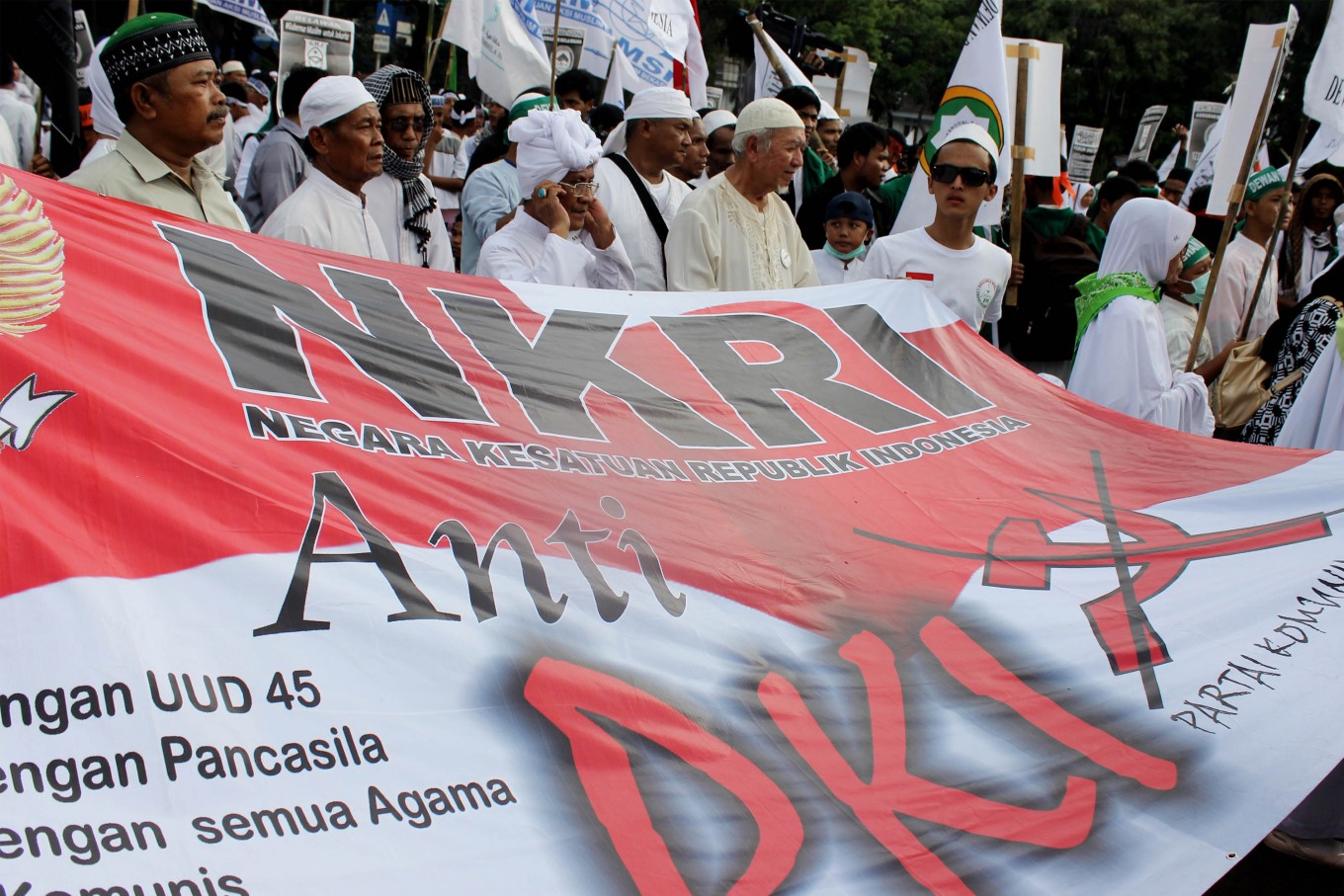
C
onservative Islam has seen a recent resurgence in Indonesia’s political landscape, most recently with the reemergence of the Masyumi Party. But moderates and other Islamic politicians were quick to dismiss the influence and aspirations of a minority in the world’s largest Muslim-majority country.
Masyumi was among the few parties participating in Indonesia’s first general election in 1955, but it was dissolved by then-president Sukarno in 1960 because of its alleged affiliation with a West Sumatra-based rebel group, the Revolutionary Government of the Republic of Indonesia (PRRI).
Sixty years later, a group of Muslims disillusioned by the Joko “Jokowi” Widodo administration announced the party’s revival in a declaration on Saturday, although some argue the new Masyumi is nothing like its predecessor.
The chairman of Masyumi’s preparatory committee, Ahmad Cholil Ridwan, said in a speech following the declaration that this political movement would determine “the fate of the Muslims” going forward.
He expressed disappointment over President Jokowi’s decision to appoint former Indonesian Army general Fachrul Razi as Religious Affairs Minister, a position that had until recently been routinely handed to members of Nahdlatul Ulama (NU), the country’s largest Muslim organization, despite NU’s sizeable role in securing the President’s reelection.
“In these kinds of situations, it is important for us to establish an ideological Islamic party,” said Ahmad.
“Insya Allah [God willing], the Masyumi Party will be the only party to support [such aspirations].”
The new Masyumi Party arrives at a political scene that is no longer in short supply of parties with an ideological bent. Amien Rais, the former chief patron of the religious-nationalist National Mandate Party (PAN), broke away from the political vehicle he had established in 1998 and founded the Ummah Party – another Islamic political party.
According to Masyumi’s Ahmad, there is a desire to see Masyumi team up with the Ummah Party and the 212 Movement – led by firebrand cleric Rizieq Shihab – to consolidate power under a single platform.
Amien, who attended the declaration event, said he would “wait and see” but suggested he would not close the door to an opportunity to have his Ummah Party form a new platform alongside Masyumi.
“If the Masyumi Party ends up growing bigger [than the Ummah Party], I will disband the party and join Masyumi,” said Amien. “If the Ummah Party turns out bigger, please join us.”
In the meantime, Rizieq, who leads the hardline Islam Defenders Front (FPI), is reportedly returning to Indonesia on Tuesday after three years of self-imposed exile in Saudi Arabia, which has fed speculation about a resurgence of hardline Islamic politics.
He said in a video uploaded to the group’s YouTube channel that he would depart on Monday evening local time and was scheduled to arrive on Tuesday morning.
Rizieq played a key role in the 212 Movement amid heightened political tension during the bitterly contested 2017 Jakarta gubernatorial race.
Observers noted that the series of rallies held by the movement, culminating in the Dec. 2, 2016 rallies at the National Monument in Jakarta, was an inflection point that shifted Indonesia’s political scene to the right.
The declaration of Masyumi and its possible team-up with two groups that run ideologically right-leaning platforms has raised some concerns over the gradual swing in favor of conservatism in Indonesia’s Islamic politics.
However, figures such as NU deputy secretary-general Masduki Baidlowi have dismissed such concerns, arguing that the majority of Muslims in Indonesia adhered to a moderate view of Islam.
“Moderate Muslims in Indonesia, I think, will not be swayed by small groups that have ambitions to establish [their own] political parties,” Masduki said on Monday.
He also insisted that both the NU and Muhammadiyah – the second-largest Muslim group in the country – had proven capable of positioning themselves among civil society groups that provided checks and balances in the country’s governance.
Paramadina University lecturer Hendri Satrio said the increasingly crowded landscape of Islamic parties meant that securing the Muslim vote would become one of the most competitive political contests in the country.
Aside from Ummah and Masyumi, Indonesia is already home to Islamic parties such as the Prosperous Justice Party (PKS), the United Development Party (PPP) and the National Awakening Party (PKB), all of which vie for the same Muslim constituents.
“With the current crop of political parties, such as the PKS, PAN and PKB, there are enough options for voters to vote for religion-based parties,” Hendri said, as quoted by Kompas.com.
Separately, senior PKS politician Hidayat Nur Wahid said the party did not feel threatened by newcomers to the political scene.
“We are not concerned about the PKS’ voters [being poached by the new parties]. We actually hope that they may secure votes from their own communities,” Hidayat said.

